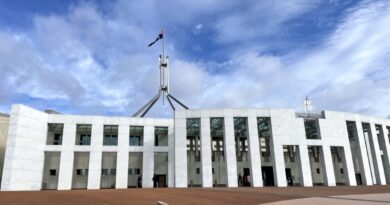Commentary
Chinese leader Xi Jinping is altering domestic laws and reinforcing state control to counter the U.S.–China trade war—a strategy that risks driving away foreign investment and further slowing China’s already faltering economic recovery.
Beijing announced on March 24 that Premier Li Qiang signed an order intensifying
China’s countermeasures against foreign sanctions, enacting new regulations under the
Anti-Foreign Sanctions Law. These rules, effective immediately, empower Beijing to list and penalize entities for “discriminatory actions,” with weapons like asset freezes, intellectual property (IP) seizures, entry denials, and trade bans spanning sectors such as education, science, and legal services.
Coupled with the revised State Secrets Law, which went into effect on May 1, 2024, and now encompasses vague “work secrets,” these measures fortify the legal arsenal of the Chinese Communist Party (CCP) amid the U.S.–China trade war, reignited by U.S. President Donald Trump’s threat of 20 percent tariffs.
This legal pivot marks a shift from openness to security, driven by Xi’s “
dual circulation” strategy launched in 2020. The approach emphasizes domestic self-reliance while selectively engaging in global trade. It’s also part of a broader agenda to revive China’s slowing economy while tightening the CCP’s control over the country.
The Anti-Foreign Sanctions Law, initially passed in 2021, targets foreign sanctions, such as U.S. restrictions on Xinjiang cotton or tech exports, by allowing China to seize IP and other assets from entities complying with such measures. It’s a retaliatory device to protect CCP interests and punish foreign companies, especially as U.S. tech bans, including
semiconductor restrictions, escalate under Biden-era
export controls.
The 2025 regulations expand this toolkit, enabling sector-specific trade bans that could hit multinationals hard. Meanwhile, the broadened State Secrets Law classifies unclassified “work secrets” and national security-related data as confidential, imposing stiff penalties for disclosures deemed harmful to state interests. This restricts transparency, echoing tensions from the 2023
Counter-Espionage Law, which blocks foreign access to critical tech and economic data, such as supply chains or financials.
Economically, Beijing frames these laws as safeguards for innovation and capital stability. The Anti-Foreign Sanctions Law’s IP seizure powers deter foreign companies from exploiting sanctions to undermine Chinese advancements, such as chip designs or artificial intelligence algorithms, ensuring they remain domestic assets.
Similarly, the State Secrets Law shields innovations—such as semiconductors—by keeping them within China, bolstering Xi’s self-sufficiency goals. These measures also curb capital flight: asset freeze threats discourage Chinese entities from shifting money or technology abroad to evade sanctions, while data restrictions limit foreign extraction of sensitive information.
On March 8, the CCP’s Supreme People’s Procuratorate presented its 2025 Work Report at the 14th National People’s Congress, China’s rubber-stamp legislature, underscoring Beijing’s growing emphasis on intellectual property enforcement. The report revealed that 21,000 individuals were prosecuted for IP-related crimes
in 2024 alone.
While framed as efforts to protect intellectual property, China’s enforcement strategies increasingly serve to safeguard the CCP’s control over sensitive sectors. Domestic crackdowns—combined with expansive laws such as the Anti-Foreign Sanctions Law—create a securitized legal environment that insulates the regime from external scrutiny.
This shift has heightened risks for foreign companies operating in China, subjecting them to opaque legal standards and politically motivated enforcement. For instance, a tech company could lose patent rights for complying with U.S. sanctions, while manufacturers might face intrusive “work secrets” audits. New IP dispute regulations, flagged by
The National Law Review, further amplify compliance burdens and increase the likelihood of IP confiscation.
These conditions directly undermine recent attempts to court foreign investment. At the
China Development Forum, Premier Li made overtures to global CEOs, promoting China’s indispensability—but the reality on the ground tells a different story. Foreign direct investment has
plummeted by 99 percent over the past three years, and a rebound is unlikely as authoritarian controls deepen.
This isolationist trajectory not only deters innovation and global integration but also threatens to derail Xi’s
$41 billion domestic consumption push. With an economy already weakened by property market instability, the additional loss of foreign capital and shrinking job creation could jeopardize billions in U.S. exports and further delay China’s long-term economic recovery.
The CCP is increasingly weaponizing IP and secrecy laws as retaliatory tools against isolation from Trump-era tariffs and G7 sanctions, fusing economics and security into a fortress-like stance. The 2021 Anti-Foreign Sanctions Law counters U.S. tech bans by authorizing IP seizures from entities obeying Western sanctions, while the 2024 State Secrets Law expansion protects Beijing from containment, broadly defining “work secrets,” and punishing data mishandling—hitting all companies in China, domestic and foreign.
The CCP’s message is blunt: comply with sanctions, lose your IP, share sensitive information, and face scrutiny. Yet this legal counterstrike drips with irony. Xi, who has repeatedly slammed Trump for tariffs and trade restrictions, declared at the 2024 APEC Summit in Lima, “Unbridled unilateralism and protectionism and an increasingly fragmented world economy threaten to reverse the trend toward economic globalization.”
The CCP might believe tighter restrictions could push the United States to negotiate, potentially securing China better access to American markets. More likely, though, these laws will repel foreign investment, further harm China’s exports, and deepen its isolation, slowing the Chinese economy even more.
Views expressed in this article are opinions of the author and do not necessarily reflect the views of The Epoch Times.





